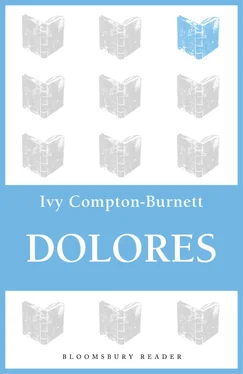Ivy Compton-Burnett - Dolores
Здесь есть возможность читать онлайн «Ivy Compton-Burnett - Dolores» весь текст электронной книги совершенно бесплатно (целиком полную версию без сокращений). В некоторых случаях можно слушать аудио, скачать через торрент в формате fb2 и присутствует краткое содержание. Год выпуска: 2013, Издательство: Bloomsbury Publishing, Жанр: Классическая проза, на английском языке. Описание произведения, (предисловие) а так же отзывы посетителей доступны на портале библиотеки ЛибКат.
- Название:Dolores
- Автор:
- Издательство:Bloomsbury Publishing
- Жанр:
- Год:2013
- ISBN:нет данных
- Рейтинг книги:3 / 5. Голосов: 1
-
Избранное:Добавить в избранное
- Отзывы:
-
Ваша оценка:
- 60
- 1
- 2
- 3
- 4
- 5
Dolores: краткое содержание, описание и аннотация
Предлагаем к чтению аннотацию, описание, краткое содержание или предисловие (зависит от того, что написал сам автор книги «Dolores»). Если вы не нашли необходимую информацию о книге — напишите в комментариях, мы постараемся отыскать её.
was published in 1911. It sold well, and was promptly forgotten. Now that her career of sixty years is ended, and her long achievement more and more acclaimed,
, standing at that remote beginning, is curiously reborn.
Dolores — читать онлайн бесплатно полную книгу (весь текст) целиком
Ниже представлен текст книги, разбитый по страницам. Система сохранения места последней прочитанной страницы, позволяет с удобством читать онлайн бесплатно книгу «Dolores», без необходимости каждый раз заново искать на чём Вы остановились. Поставьте закладку, и сможете в любой момент перейти на страницу, на которой закончили чтение.
Интервал:
Закладка:
Ivy Compton-Burnett
Dolores
Introduction
The first and till now the only edition of Dolores was published by Blackwoods in 1911. It sold well, and was promptly forgotten; apparently even its author did not want to remember it, since she did not publish another novel until 1925, nor did she include Dolores , the first of her twenty novels, in later lists of her publications. But now that her career of sixty years is ended, and her long achievement more and more acclaimed, Dolores , standing at that remote beginning, is curiously reborn. When a writer is alive, his works tend to be regarded one by one, as they appear; when he is dead, they tend to be seen as the whole they have become. The genesis of genius attracts a natural speculation. If the author of Dolores preferred to forget it, her readers will not. When a writer dies, he loses his privacy, all but his essential, his irremediable privacy; and critics, disciples, the rare book dealer and the bibliographer would not leave him that, if they could help it.
The first edition of Dolores (which is now virtually unobtainable) contains in its end pages, in the manner of volumes at that time, a thirty-two page Catalogue of Messrs Blackwood & Sons’ Publications. It is interesting reading. Black-woods was publishing Conrad and Forster; The Longest Journey was in its second impression. But its leading author by far was George Eliot, dead thirty years, one Victorian who still retained her eminence. Of her works Blackwoods offered a New Popular Edition, a Warwick Edition, a Standard Edition, a Cabinet Edition, a Popular Copyright Edition, and a Cheap Edition. There was even a new edition, at 3/6, of Wise, Witty, and Tender Sayings, in Prose and Verse, selected from the Works of George Eliot . Among her great female predecessors in the English novel, I. Compton-Burnett is in a general way most like Jane Austen, least like Charlotte Brontë, but the dominant influence on Dolores is George Eliot, an influence so pervasive that it extends to characterisation and tone, subject, theme, and even diction.
Perhaps it extends too far or not far enough, because Dolores seems both overdone and underdone Eliot. Its story concerns a young Victorian woman, Dolores Hutton, who sacrifices her chances for personal happiness to the larger interest of duty to her family. Its settings are the village of Millfield in Yorkshire, where Dolores’ father, the Reverend Cleveland Hutton, is rector, and Oxford, where Dolores attends a woman’s college; the twenty-one chapters of the novel are fairly evenly divided between Millfield and Oxford. Its characters are, in Millfield, the members of the middle-class households of that village (Hutton; Blackwood; Cassell; Merton-Vane), and, in Oxford, the women teachers at Dolores’ college, a don or two, two school companions and friends of Dolores, and a great but unrecognised dramatist (his name alone, Sigismund Claverhouse, might seem to have conferred a certain notoriety). Its structure is a series of Dolores’ dutiful sacrifices: to begin with, she must reject a position as teacher in her college upon her graduation from it to become instead the governess of a younger stepbrother and stepsisters. The favourite child of her father the rector, Dolores bears patiently the ill will of her stepmother. When an uncle provides for the education of her pupils, Dolores is free to return to Oxford and to Claverhouse, whom she loves and reveres. Unfortunately Claverhouse has fallen in love with Dolores’ shallow and pretty friend Perdita, and it becomes Dolores’ task to help bring about this marriage. It is brought about, but after nine months Perdita Claverhouse dies in childbirth, and Dolores returns to her role of spiritual companion and amanuensis to Sigismund, whose eyesight is failing, and who has begun to reciprocate her love. Frustration, however, is the rule: her stepmother dies, and Dolores must return to Millfield to preside over her lonely father’s house. She does so, for the next five years. She rejects an Oxford don (‘Soulsby’) who has long admired her when she discovers that her younger sister Sophia is in love with him. It is once again a question of their father the rector’s needs, and Dolores easily arranges that Soulsby marry Sophia instead of herself, herself continuing the martyr role of father companion. On a brief visit to Oxford, Dolores is re-united with Claverhouse, near-blind and near death. In a climax of self-abnegation Dolores comes back to her father, to find, ironically, that he is about to marry for the third time and no longer needs her. The irony is compounded in that Claverhouse, whom she is now free to join, dies during her brief absence from him. She ends as teacher in the women’s college.
Presumably, for the rest of her life, she will be a dutiful teacher. Duty is a keyword in George Eliot’s novels, and it is here; sometimes, as the preceding synopsis has shown, assuming the classical form of duty versus love. The sense of duty that inspires the highminded Dorothea Brooke, the heroine of Middlemarch , is the same sort of obligation felt by Dolores Hutton. They are related in other ways. The young Dorothea’s marriage to the middle-aged pedant Casaubon, whose magnum opus is to be a Key to All Mythologies , resembles Dolores’ devotion to Claverhouse, who is much older than she, and whose dramas, as they are once or twice described, sound similarly vast. Unfortunately neither Dolores’ nobility nor Claverhouse’s dramas are questioned ironically as their counterparts in Middlemarch are. Dorothea’s sense of duty is presented as both noble and absurd. Dolores’ is only noble. And thus becomes, too insisted-upon as it is, absurd inadvertently. What ironies in Dolores there are, are amateur, discrete, and heavy observations of discrepancies, while those in Middle-march seem like the inevitable products of a grave, austere, and philosophic vision.
There are in Dolores a range of social comment, an attention to class differences, and an emphasis on setting that will not be met with again in the following nineteen novels. They show that the author of Dolores was conversant with the typical scope and the areas of comment of Eliot and the other Victorians. Specifically Eliotean is an insistence upon the importance of ‘low’ or obscure destinies, on the heroism of the unheroic. Such ‘ideas’, the cast of intellectualism to Dolores , are rare or missing in the later nineteen.
There are other Eliot echoes. The addresses to the reader, of which there are many, reproduce the tone of Eliot’s addresses, weightily humorous, portentous, finger-wagging. Didactic throughout, the author of Dolores tells us very early that ‘Dolores’ means ‘sorrows’ (for duty is sacrifice and suffering), reminds us much later that the heroine’s life has been sorrowful, and even supplies a happier-natured friend named Felicia to drive the point home. George Eliot almost never wrote a light or supple phrase, and, knowing Dame Ivy’s later style, one finds astonishing the sentences like polysyllabic puddings in Dolores . The following can serve as example for those Eliot-derived habits of style just mentioned:
Now, as a person of observation, and knowledge of human nature in its subtler aspects, for example, as acted upon by difference in religious views and sameness of blood, are you disposed to dark surmise on the relations of the houses of Blackwood and Hutton; or wondering how long it had been since relations between them existed? In this thing you may take heart. Their ground of intercourse never presented clefts on its surface, though the ensuing stratum was at times volcanic. As far as the masters of the families went, the intercourse was so entirely on the surface, that this covered eruptiveness did not affect it. (Chapter II.)
Читать дальшеИнтервал:
Закладка:
Похожие книги на «Dolores»
Представляем Вашему вниманию похожие книги на «Dolores» списком для выбора. Мы отобрали схожую по названию и смыслу литературу в надежде предоставить читателям больше вариантов отыскать новые, интересные, ещё непрочитанные произведения.
Обсуждение, отзывы о книге «Dolores» и просто собственные мнения читателей. Оставьте ваши комментарии, напишите, что Вы думаете о произведении, его смысле или главных героях. Укажите что конкретно понравилось, а что нет, и почему Вы так считаете.












